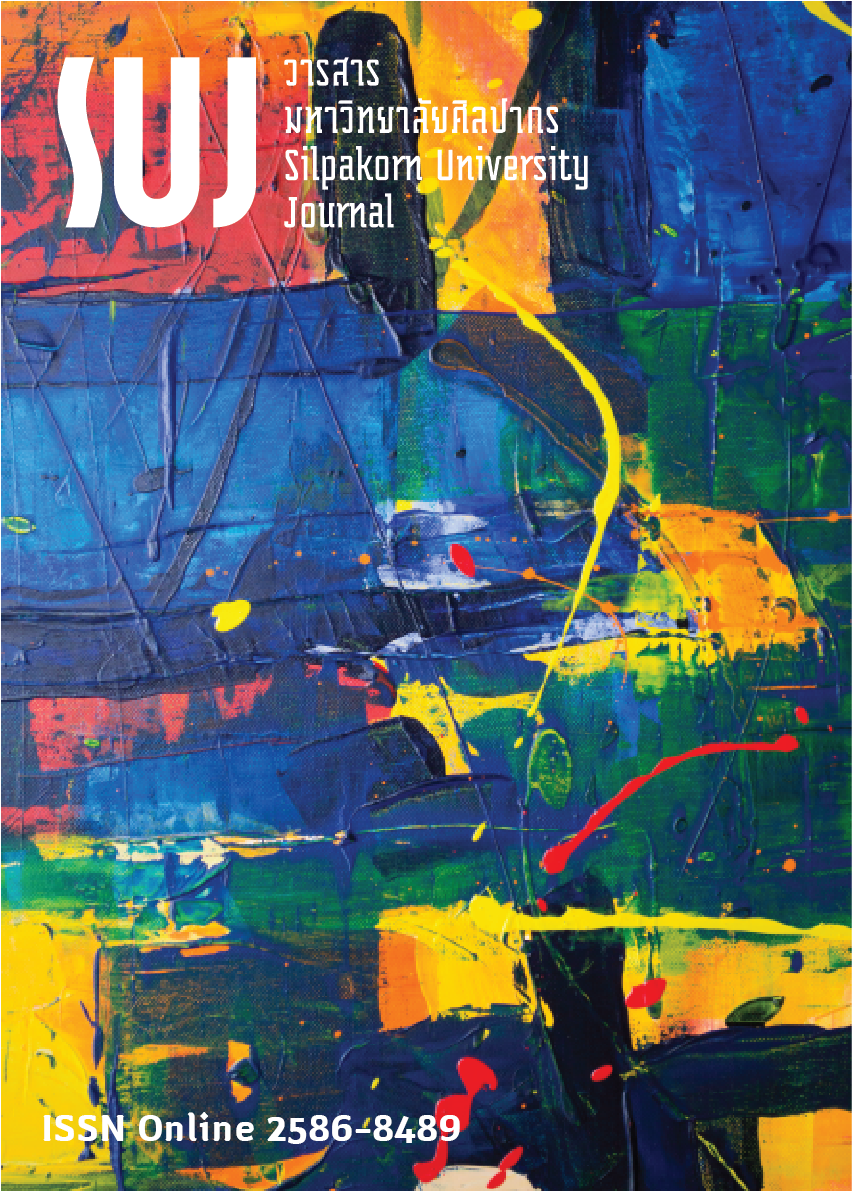การจัดการสมาคมเรือประมงชายฝั่งคลองนาทับกับความมั่นคงทางอาหาร เพื่อความยั่งยืนของชุมชน ตำบลนาทับ อำเภอจะนะ จังหวัดสงขลา (Management of Khlong Na Thap coastal fishing boats association and food security for community sustainability of Na Thap Sub-district, Chana district, Songkhla province)
Main Article Content
Abstract
งานวิจัยนี้มีวัตถุประสงค์เพื่อศึกษาจัดการสมาคมเรือประมงชายฝั่งคลองนาทับกับความมั่นคงทางอาหารของชุมชนที่นำไปสู่ความยั่งยืน และเพื่อศึกษาแนวทางการพัฒนาสมาคมเรือประมงชายฝั่งคลองนาทับสู่ความยั่งยืนโดยใช้ระเบียบวิธีวิจัยเชิงคุณภาพ ได้แก่ เทคนิคเดลฟายประยุกต์ การสัมภาษณ์แบบเจาะลึก การสนทนากลุ่ม การสังเกตแบบมีส่วนร่วมและไม่มีส่วนร่วม เป็นเครื่องมือรวบรวมข้อมูลภาคสนาม ทั้งนี้ การใช้เทคนิคเดลฟายประยุกต์ ผู้วิจัยได้ให้ผู้เชี่ยวชาญตอบแบบสอบถามเดลฟายจำนวน 3 รอบ จนกระทั่งความคิดเห็นของผู้เชี่ยวชาญมีความคิดเห็นที่สอดคล้องกัน รวมทั้งมีการสัมภาษณ์แบบเจาะลึก การสนทนากลุ่ม การสังเกตแบบมีส่วนร่วมและไม่มีส่วนร่วมผู้ให้ข้อมูลหลัก 3 ฝ่าย ได้แก่ ฝ่ายนโยบาย ประกอบด้วย ประธานและคณะกรรมการของสมาคมเรือประมงชายฝั่งคลองนาทับ ฝ่ายบริหาร ประกอบด้วย เจ้าหน้าที่ของสมาคมเรือประมงชายฝั่งคลองนาทับ และฝ่ายปฏิบัติ ประกอบด้วย แกนนำสมาชิก และผู้ให้ข้อมูลรอง คือ สมาชิกของสมาคมเรือประมงชายฝั่งคลองนาทับ จากนั้นผู้วิจัยจึงนำข้อมูลมาวิเคราะห์ร่วมกับการศึกษาเอกสารและงานวิจัยที่เกี่ยวข้อง โดยใช้การวิเคราะห์เชิงเนื้อหาและพรรณนา
ผลการศึกษา พบว่า การจัดการสมาคมเรือประมงชายฝั่งคลองนาทับมีการดำเนินการเป็น 3 ส่วนหลัก คือ ภาวะผู้นำเป็นแกนหลักในการกำหนดเป้าหมาย และการมีส่วนร่วมของสมาชิกที่เป็นแรงผลักดันในการดำเนินงาน อีกทั้งสมรรถนะองค์การทำให้เกิดการขับเคลื่อนขององค์การได้อย่างต่อเนื่อง ทั้งนี้การฟื้นฟูทรัพยากรสัตว์น้ำ ส่งผลทำให้เกิดความมั่นคงทางอาหารของชุมชน ทำให้คนในชุมชนมีแหล่งอาหารที่อุดมสมบูรณ์ และเพียงพอต่อความต้องการของคนในชุมชน อีกทั้งเป็นการรักษาวิถีชีวิตในการประกอบอาชีพการทำประมงในชุมชนต่อไป รวมถึงจะนำไปสู่ความยั่งยืนของชุมชนในด้านสิ่งแวดล้อม ด้านเศรษฐกิจ และด้านสังคม
The purposes of this study were to investigate the management of Khlong Na Thap Coastal Fishing Boats Association and community food security leading to sustainability and to explore guidelines for development of Khlong Na Thap Coastal Fishing Boats Association towards sustainability. This paper deployed a qualitative research methods, namely Delphi techniques, in-depth interviews, focus group discussions, participant observation and non-participant observation in order to collect data from the fieldwork. In using Delphi techniques, sampled experts answered three rounds of questionnaires until their consensus was reached. For the in-depth interviews, focus group discussions, participant observation and non-participant observation, there were three groups of primary key informants: the policy group consisted of the chairman and committee members of Khlong Na Thap Coastal Fishing Boats Association; the administration group consisted of officers of Khlong Na Thap Coastal Fishing Boats Association; and the practice group consisted of the core leader of association members. The secondary key informants were members of Khlong Na Thap Coastal Fishing Boats Association. Then, the data were analyzed together with data from related literature and research reports; content analysis as well as descriptive analysis were employed.
The study found that the management attributes of Khlong Na Thap Coastal Fishing Boats Association comprise three major folds: the leadership as the core for goal-setting; the member participation as the drive force for operations; and finally the organizational competencies to continuously mobilize the organization. Arevival of aquatic animals contributes to community food security which can provide people with abundant food resources that meet the needs of people in the community. Additionally, it conserves the way of life in fishing in the community that will lead to sustainability of the community environmentally, economically and socially.
Downloads
Article Details
References
Auareesuksakun, Arunrung. and Chuntuk, Teerawat. (2016). Transformational Leadership: Changing Challenges to Achieve Organization Sustainability (ภาวะผู้นำการเปลี่ยนแปลง: เปลี่ยนความท้าทายมุ่งสู่ความสำเร็จขององค์การอย่างยั่งยืน). Veridian E-Journal, Silpakorn University, 9(1): 845-860.
Bank of Thailand. (2016). Fishery production in the Southern part (ผลผลิตประมงในภาคใต้). [Online]. Retrieved May 15, 2018 from https://www2.bot.or.th
Bendem-Ahlee, Sawarin. and Parinyasutinun, Utai. (2012). Human way of life and the way of life of people along Na Thap Canal, Na Thap Sub-district, Chana District, Songkhla Province (วิถีคนและวิถีคลองนาทับ ตำบลนาทับ อำเภอจะนะ จังหวัดสงขลา). Journal of Humanities and Social Sciences, 4(8): 129-139.
Bennett and Dearden. (2014). Why local people do not support conservation: Community perceptions of marine protected area livelihood impacts, governance and management in Thailand. Journal of Marine Policy, 44: 107-116. [Online]. Retrieved May 15, 2018 from https://www.sciencedirect.com
Buntham, Natthida. (2012). Human security (ความมั่นคงของมนุษย์). Bangkok: Square Print 93.
Bureekul, Tawinwadee. (2008). Participation: concept, theory, and process. (การมีส่วนร่วม: แนวคิด ทฤษฎีและกระบวนการ). Bangkok: King Prajadhipok’s Institute.
Chai-umporn, Supannee., & Rungmaungthong, Vilailak. (2014). Food concepts: Challenges to government policy on human food (แนวคิดว่าด้วยเรื่องอาหาร…ความท้าทายต่อนโยบายด้านอาหารมนุษย์ของรัฐ). Journal of Social Development, 16(2): 103-117.
Chanyachailert, Thasina., Satchawatcharaphong, Suntharin. and Michai, Traipop. (2012). From nutritional bases to sweet, fatty, and salty labels (จากพื้นฐานโภชนาการสู่ฉลากหวาน มัน เค็ม). Bangkok: Thai Dietetic Association and Food Industry Group, the Federation of Thai Industries.
Diesendorf. (1999). Sustainability and Sustainable Development. [Online]. Retrieved March 30, 2018 from https://markdiesendorf.com
Doherty, Wanawan. (2011). Communication for Organizational Changes (การสื่อสารเพื่อการเปลี่ยนแปลงองค์กร). Naresuan University Journal, 19 (3): 1-8.
Food and Agriculture Organization of the united nations. (2006). food security. [Online]. Retrieved March 30, 2018 from https://www.fao.org
Information Technology Office, Department of Customs. (2016). Top export values. Retrieved March 30, 2018 from https://dataservices.mof.go.th
Intarapoom, Iit., Srisompun, Orawan., & Sinsiri, Narit. (2016). The ASEAN and food security (ภูมิภาคอาเซียนกับความมั่นคงทางอาหาร). Khon Kaen Agriculture Journal, 44(1): 191-200.
Jansiri, Nantida. (2012). Governance: Contexts and approaches in public administration (ธรรมาภิบาล: บริบทและมุมมองด้านการบริหารรัฐกิจ). Walailak Journal of Social Sciences, 7(7): 125-145.
Maket, Wongtrakoon. (2016). Guarantees of food security in the community: A case study of Pa Trong community, Mueang District, Prachinburi Province (การสร้างการประกันความมั่นคงทางอาหารในระดับชุมชน: กรณีศึกษาชุมชนป่าตรง อำเภอเมืองปราจีนบุรี จังหวัดปราจีนบุรี). Research and Development Journal, Loei Rajabhat University, 11(38): 67-85.
Na Nongkhai, Surachart. (2009). Differences between administration and management (ความแตกต่างระหว่างการบริหารกับการจัดการ). Journal of Public Health Administration, 14(1): 58-62.
Narinsin, Sirinthip. (2014). ASEAN food security cooperation (ความร่วมมือด้านความมั่นคงทางอาหารอาเซียน). Journal of politics, administration and law, 6(3): 443-469.
Nasuchon and Charles. (2010). Community involvement in fisheries management: Experiences in the Gulf of Thailand countries. Marine Policy, 34: 163-168. [Online]. Retrieved May 15, 2018 from https://www.sciencedirect.com
Phonwatthana, Ladda. (2014). Good governance and university administration (ธรรมาภิบาลกับการบริหารมหาวิทยาลัย). Journal of Educational Administration, Burapha University, 8(2): 16-27.
Phromsri, Chaisate. (2010). Crisis management (การบริหารวิกฤตการณ์). Journal of Humanities and Social Sciences, Surat Thain Rajabhat University, 2(1): 41-54.
Prasertsri, Rangsun. (2011). Innovation and Organization Change (นวัตกรรมและการเปลี่ยนแปลงในองค์การ). Journal of Administrative and Management Innovation, 1(1): 23-30.
Suphakham, Rangsan. (2016). Human security and ASEAN: Public diplomacy, the ASEAN way and its identity gap (ความมั่นคงมนุษย์กับอาเซียน: การทูตสาธารณะ วิถีอาเซียนกับช่องว่างทางอัตลักษณ์). Journal of East Asian Studies Center, 16(1): 60-86.
Taweewong, Nusajee. (2009). Community Rights (สิทธิชุมชน). Bangkok: Sustainable Development Foundation.
Wedchayanon, Nisadarn. (2009). The Study of Comparing the Difference in the Application of Competency Model between Public and Private Organizations (การศึกษาเปรียบเทียบความแตกต่างของการนำเอากรอบสมรรถนะมาใช้ในองค์การภาครัฐและภาคเอกชนของไทย). NIDA Development Journal, 49(1): 67-100.
Yodsurang, Supatra. (2017). Research: Community about community development (ปกิณกฎาวิจัย: ชุมชนเกี่ยวกับการพัฒนาชุมชน). Journal of Public Administration, 15(1): 105-113.
Yourapratom, Anantachai., Kittisuntrakul, Charatwan., Bunchavachirachai, Witchapol., Vitthayathavorn, Saowaporn. Santhayati, Nareerat. & Tipayanon, Jiwatsa. (2014). Sustainable Development (ไขความหมายการพัฒนาอย่างยั่งยืน). Nonthaburi: Vanida publishing.


